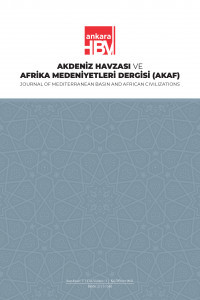NİJERYA'DA SEÇİMLERİN ASKERİLEŞTİRİLMESİ: DEMOKRATİK BÜYÜME İÇİN BİR BANE
MILITARIZATION OF ELECTIONS IN NIGERIA: A BANE OF DEMOCRATIC GROWTH
___
- Amnesty International Nigeria. (2018), No Accountability for Human Rights, Submission for the UN Universal Periodic Review, 31st Session of the UPR Working Group.
- Anthony Egobueze and Callistus Ojirika (2017) Electoral Violence in Nigeria’s Fourth Republic: Implications for Political Stability. Journal of Scientific Research & Reports 13(2): 1-11, Article no. JSRR.20750
- Constitution of the Federal Republic of Nigeria, (1999), Section 218 Davies Iheamnachor, 5/3/19. Available online Retrieved 20/07/2019 from https://allafrica.com/stories/201903050322.html.
- Dorina Bekoe. (2010). Trends in Electoral Violence in Sub-Saharan Africa, Peace Brief 13, United Nations Institute of Peace.
- European Union Election Observation Mission Nigeria (2019) Final Report, p.35 Houngnikpo, Mathurin C. (2016) Guarding the Guardians: Civil-military Relations and Democratic Governance in Africa. London: Routledge.
- INEC press release: (March 15, 2019). Rivers State Governorship Election.
- Nereus I. Nwosu. (2000). Thirty-Six Years of Independence in Nigeria: The Political Balance Sheet: Africa: Rivista trimestrale di studi e documentazione dell'Istituto italiano per l'Africa e l'Oriente. Anno 55, No. 2 pp. 151-166
- Ochoche, S A. (1997) Electoral Violence and National Security in Nigeria’. Africa Peace Review, Journal of the Centre for Peace Research and Conflict Resolution 1(1).
- Osisioma B C Nwolise, Electoral Violence and Nigeria’s 2007 Elections, (2007) Journal of African Elections. Vol.6, Issue 2. P 155-179
- Philip Terzungwe (2018) Electoral Fraud, Electoral Violence and Democratic Consolidation in Nigeria. Journal of Peace and Development. Pg. 32-47
- Section 29(3) of the Electoral Act 2010 (as amended)
- Stella Eneche, Available online Retrieved 20/07/2019 https://businessday.ng/ng-election/article/we-have-deployed-95-percent-personnel-for-elections-army/
- UNDP (United Nations Development Programme), (2002). Deepening Democracy in a Fragmented World, Human Development Report, Oxford: Oxford University Press, p.4
- Universal Declaration of Human Rights (adopted 10 December 1948) Art 21, para.3
- Walter James Shepard. (1935), ‘Socialism, Fascism, and Democracy’, 180 The Annals of the American Academy of Political and Social Science, pp. 94-101 https://www.msn.com/en-xl/africa/africa-top-stories/nigerias-electoral-body-cautions-buhari-atiku/ar-BBTPCSe?li=BBKhQr3. Assessed on 20/07/2019
- ISSN: 2717-7548
- Yayın Aralığı: Yılda 2 Sayı
- Başlangıç: 2019
- Yayıncı: Ankara Hacı Bayram Veli Üniversitesi
TÜRKİYE'S FOREIGN AID TO AFRICA UNDER AK PARTY: A CONSTRUCTIVIST APPROACH
İYİLİK YÜREK İSTER: “İYİLİK YOLUNDA ETİYOPYA”, FECR YAYINLARI: ANKARA
YENİDEN MİLLİ MÜCADELE DERGİSİNDE AFRİKA (1970-1980)
NİJERYA'DA SEÇİMLERİN ASKERİLEŞTİRİLMESİ: DEMOKRATİK BÜYÜME İÇİN BİR BANE
Don Juan Manuel'in Eserlerinde İslâm Kültürü ve Müslümanlar
ABBASİLER DÖNEMİ (H.255-270/MS.869-883) BAĞDAT’TA ZENCİ İSYANI ve ALİ B.MUHAMMED’İN ROLÜ
